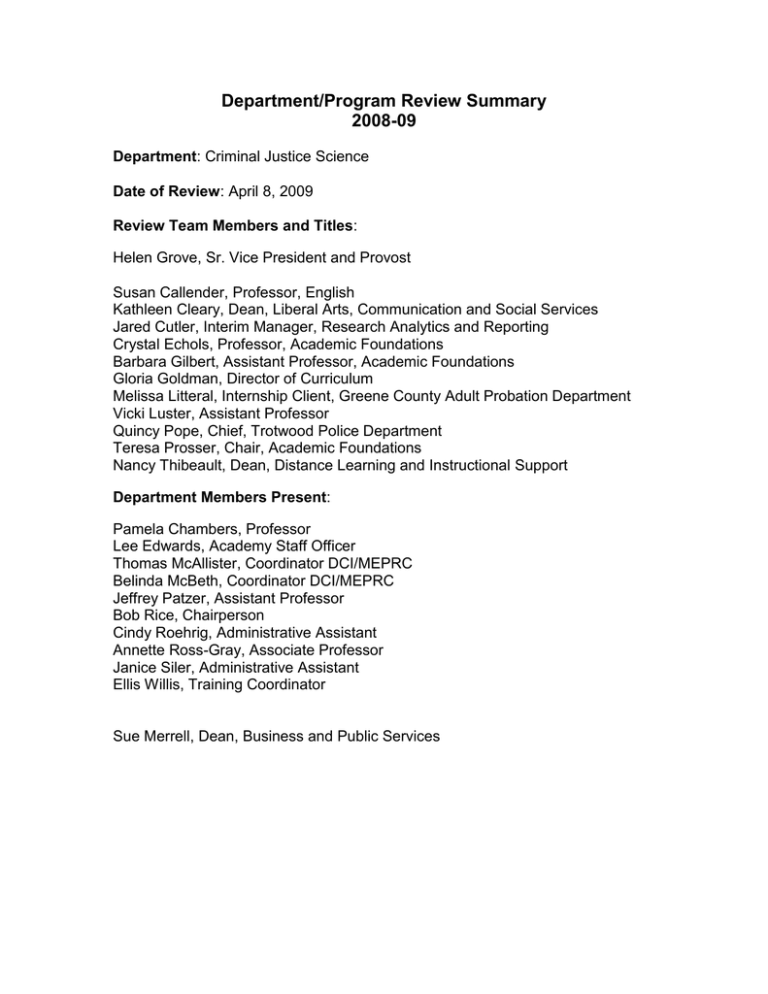Department/Program Review Summary 2008-09
advertisement

Department/Program Review Summary 2008-09 Department: Criminal Justice Science Date of Review: April 8, 2009 Review Team Members and Titles: Helen Grove, Sr. Vice President and Provost Susan Callender, Professor, English Kathleen Cleary, Dean, Liberal Arts, Communication and Social Services Jared Cutler, Interim Manager, Research Analytics and Reporting Crystal Echols, Professor, Academic Foundations Barbara Gilbert, Assistant Professor, Academic Foundations Gloria Goldman, Director of Curriculum Melissa Litteral, Internship Client, Greene County Adult Probation Department Vicki Luster, Assistant Professor Quincy Pope, Chief, Trotwood Police Department Teresa Prosser, Chair, Academic Foundations Nancy Thibeault, Dean, Distance Learning and Instructional Support Department Members Present: Pamela Chambers, Professor Lee Edwards, Academy Staff Officer Thomas McAllister, Coordinator DCI/MEPRC Belinda McBeth, Coordinator DCI/MEPRC Jeffrey Patzer, Assistant Professor Bob Rice, Chairperson Cindy Roehrig, Administrative Assistant Annette Ross-Gray, Associate Professor Janice Siler, Administrative Assistant Ellis Willis, Training Coordinator Sue Merrell, Dean, Business and Public Services Commendations: This department includes diverse components – the associate’s degree and certificate programs, the Criminal Justice Training Academy and the Advanced Job Training Program at DCI and MEPRC. The department does an excellent job of successfully carrying out the mission of each of these initiatives and balancing its efforts among these diverse components. The faculty and staff of the department are well-credentialed, committed to their profession and demonstrate a strong spirit of collegiality. CJS has a strong cadre of adjunct faculty who provide excellent links to criminal justice agencies throughout the region. The department chair, Dr. Robert Rice, serves as an effective leader who models a commitment to continuous improvement, high quality service to students and dedication to ensuring the department’s responsiveness to regional law enforcement, corrections, and security agencies. The academy program is well developed, ably led by Commander Willis, respected throughout the region and successful in accomplishing its mission. The number of graduates, their performance on the state certification examination and their hire rates are impressive. The Advanced Job Training program represents a very valuable service not only to inmates but also to the region and to the college, and the program is carried out well under the leadership of Mr. Tom McAllister. The recently revised curriculum in the department reflects currency and good alignment with emerging emphases in law enforcement and corrections. The new Tech Prep pathway represents significant potential for increasing not only the number of students in the department but also the level of their preparation for college work. The department’s recent enrollment growth appears to be well managed. Continue the department’s support for testing and roll-out of the content of new OPOTA training standards. The department’s assumption of campus responsibility for student background checks has provided a very valuable service, and the work of Ms. Janice Siler in carrying out over 2000 background checks to date is greatly appreciated. Recommendations for Action: The department is encouraged to expand its understanding and use of assessment to document and improve student learning outcomes. Inservice for faculty as well as consultation through Learning Liaisons may prove useful in this endeavor. Particular attention to assessing student mastery of general education outcomes as well as overall learning outcomes for each program is recommended. By the time of its next review, the department should have established and documented cycles of review and improvement as part of its assessment work. To complement and expand its assessment work, the department will need to continue to develop data to inform its work. Although the annual data set contains a great deal of relevant information, the diverse components of the department as well as the nature of the fields served by the department necessitate additional data collection. The department is encouraged to continue the good work already begun with RAR on this endeavor. In order to move into online teaching and learning effectively, the department is encouraged to begin immediately to engage its faculty in using online course enhancements in its face-to-face courses. This initial groundwork will improve the readiness of the faculty to develop and deliver online classes. Ensure that the department makes maximum use of its advisory board and that the board meets often enough to remain closely connected to the department’s programs. In an effort to support the goals of area agencies to employ a diverse workforce, the department is encouraged to expand its efforts to attract and retain a diverse student population. Explore options for expansion of degree, certificate and continuing education offerings in Warren County. The private security training has long had low enrollment. Determine how to increase enrollment or consider eliminating the program. Overall Assessment of Department’s Progress and Goals: The Criminal Justice Science Department is a well-managed, growing and forward-looking department that clearly is doing a very good job of serving the needs of employers in the region. The commitment to continuous improvement in the department serves as a strong foundation for refining its existing work as well as for moving in new directions. The department appears to have strong, effective relationships with key agencies in the region who employ the department’s graduates. Institutional or Resource Barriers to the Department’s Ability to Accomplish its Goals, if any: With the growth in the size and curriculum of the Criminal Justice Training Academy, additional space may be warranted. The Department presents an interesting case for the establishment of a regional public safety training site/facility that brings the Business and Public Services Division’s programs in CJ, EMS and fire science into one facility. Such a consolidation could provide for greater synergy and collaboration among these programs and expanded service to the region. The department needs the assistance of the marketing staff on campus in order to develop a successful strategy for recruiting more minority students.

